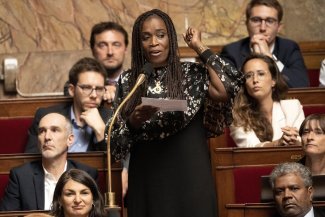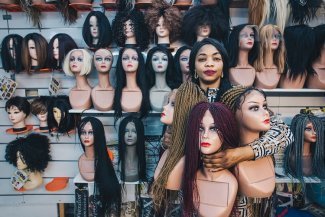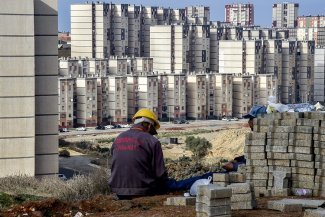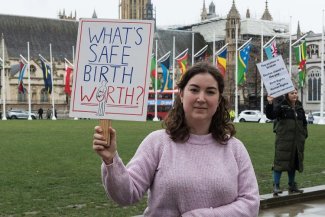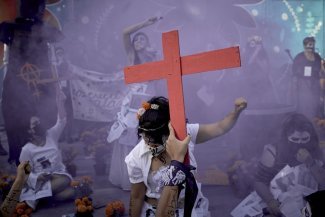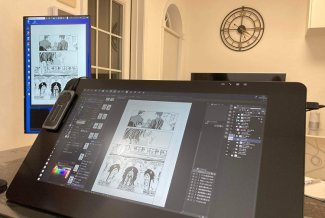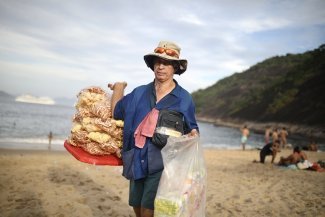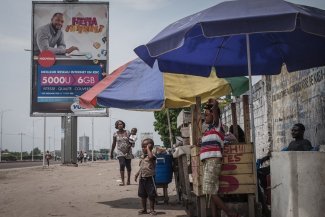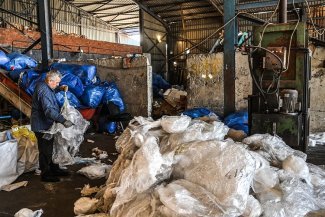An estimated 400,000 to 600,000 undocumented migrants live in France. Most of them work. They are caretakers, domestic workers, security guards, cleaners, labourers, plasterers, hairdressers, refuse collectors, delivery drivers, night watchmen and dishwashers.
Entire sectors of the French economy rely on these workers. People like Adama, Amadou, Amara, Arif, Béchir, Charly, Cheikh, Georgette, Hamadi, Harouna, Jilani, Jacobine, Makan, Minkoro, Moussa, Nabil, Ousmane, Rahim, Sidonie and Siré perform the vital work that others will not.
All of them are working to accumulate sufficient proof of employment to have their immigration status regularised. A circular issued in 2012 (known as the ‘Valls Circular’ after then Interior Minister Manuel Valls) specifies eligibility rules according to which undocumented migrants can apply for a residence permit from a prefecture, either on the basis of employment or on the grounds of private and family life.
In ‘Preuves’ (‘Proof’) – a series realised by photographer Camille Millerand between January 2020 and December 2022, and featuring excerpts from the subjects’ testimonies – these men and women recount their daily lives and experiences.

Gangué and Makhan work as dishwashers in the kitchen of a Parisian restaurant. Both have submitted to the CGT office all the documents required to prove their presence and professional activity in France. Until they are regularised, both men wish to remain anonymous. February 2022.
In the Paris region, the restaurant industry is known for employing large numbers of undocumented migrants like Gangué and Makhan, who are essential to the smooth operation of kitchens. Some even work at the restaurants where members of parliament eat, serving France’s political elite. For several months now, some employers in the industry have been calling for a review of the procedures for granting residence permits to their workforce and calling out the “hypocrisy of the system”.
Ten years ago, the Confédération Générale du Travail (General Labour Confederation, CGT) set up an office in the 19th arrondissement of Paris to help these workers navigate the complex administrative procedures of applying for regularisation, which requires proof of employment and presence in France. Almost all of these workers have been living in the country for many years. In order to be considered by prefectural authorities, applicants must submit a promise of employment on a permanent contract.

Minkoro, 37, from Côte d’Ivoire, has been living in France since the summer of 2014. At the time this portrait was taken, he was working as a security guard in shopping centres and swimming pools in the Paris region. The security sector also employs many illegal immigrants. Saint-Denis. June 2020.
When the photographer first met Minkoro, he was working as a security guard and spending his spare time helping exiles in a support centre. He told Millerand in 2022: “I’ve been here for nearly eight years now. I’ve integrated. I’m active in voluntary organisations and I’m studying accountancy. I don’t know what else I need to do to get my rights and papers,” he says.
Minkoro has since obtained a diploma in Business and Administration Management in September 2023 and found a job in a call shop. His employer has agreed to provide him with payslips, which will finally enable him to apply for a residence permit.

Originally from Côte d’Ivoire, Georgette works as an office cleaner at several locations throughout Paris and its suburbs and spends a lot of time on public transport. She earns around €1,200 a month. Neuilly-sur-Seine. March 2022.
“Since I don’t yet have my papers, my transport pass is in someone else’s name. My telephone [subscription] is also in the name of another person, who I pay at the end of every month. The only thing I have in my name is a savings account.”
Georgette was initially able to work using the papers of the daughter of one of her friends, who deducted a percentage of her income each month. She later began receiving payslips in her name. This enabled her to apply for a residence permit at the prefecture, which is still pending.

Sidonie is from Cameroon. She works as a home help for the elderly, disabled and seriously ill. She looks after their daily washing, cleaning, ironing and grocery shopping. Paris, France. May 2022.
“The hardest thing about this job is all the walking. Going from home to home is tiring. Dealing with the families of the elderly people I look after is also challenging. The families are too demanding,” says Sidonie.
After living in Algeria for two years, she crossed the Mediterranean via Libya, arriving in Italy in 2016. After spending time in several countries, she arrived in France in 2018. Sidonie left behind two daughters and two sons in Cameroon. She lives in a hotel room in Paris.

Amara, 35, originally from Mali, has been working for Christophe Pereira (background), a builder, since June 2020. Together they renovate flats for private individuals. Pereira provides Amara with the payslips he needs to apply for a residence permit. Paris, France. June 2022.
Thanks to his employer’s commitment to his administrative affairs, Amara was able to obtain a residence permit in November 2022, valid for one year. When the photographer met with the two men, Pereira said: “I’ve known Amara for five years. We first worked together for a company. When I started out on my own, I immediately thought of him because he’s always very dedicated, always very hard-working. In the beginning I worked off the books until I was able to get my business going. He explained his situation to me and I absolutely wanted to help him. I provided him with an employment contract, payslips and social security declarations. It’s important for him to make his own life, to be free.”

A sit-in by around 30 CGT trade unionists outside the hotel where the CRIT-Intérim group’s general meeting of shareholders was being held. The trade unionists were demanding that the company recognise Mr Konaté, a digger who had died a few weeks prior, as a full employee and pay the cost of repatriating his body to Mali. June 2022.
Mr Konaté was an undocumented worker recruited by a temporary employment agency for a subcontractor on a building site at Place de l’Odéon, Paris. He died following an accident on a gas pipe.
Many of the occupations carried out by undeclared workers carry a high risk of workplace accidents, which can sometimes be fatal. This is particularly true of the construction sector and other outdoor jobs (delivery workers, refuse collectors). According to association and trade union activists, the dangerous working conditions associated with these occupations are precisely the reason they are only carried out by people without legal status.

Arif, a 39-year-old Bangladeshi, works in a dry cleaner’s collecting parcels and cleaning washing machines from 11am to 9pm, six days a week. He earns around €700 a month in cash. May 2022.
Arif arrived in France in 2010 from Sylhet, a town in the north-east of Bangladesh. He initially had trouble finding work because he didn’t speak French. His first job was as a night cleaner in a bakery on the outskirts of Paris. Following a health problem, he was left without any resources and relied on money sent by his sister in Italy. During his long period of convalescence, he began to learn French.

On this day, after three years of undeclared work, Makan finally had an appointment at the Paris Prefecture to collect his residence permit, valid for one year. The prefecture has been overwhelmed with applications since 2020, which has resulted in increasingly long waiting times for applicants. Paris. April 2022.
Originally from Mali, Makan arrived in France in 2018. Since then, his life has been spent working to help his family back home. “I do nothing for fun. I’ve never been to the cinema, I’ve never been to the stadium, I’ve never been to a nightclub”. Despite his lack of papers, he was quickly able to find work as a dishwasher in the kitchen of a large Parisian restaurant. Following a strike, he secretly decided to join a union. His boss eventually gave him the payslips he needed to obtain his first residence permit in April 2022, which was then renewed for a further four years.
In addition to his job in a chic brasserie a stone’s throw from the Champs Élysées, Makan works as a delivery driver for Deliveroo. He hopes to train as a cook so he can leave his job as a dishwasher and ultimately find bigger accommodation than the 14m² room in a hostel that he shares with a fellow Malian.

Thirty-four undocumented workers enter the headquarters of a temporary employment company in Saint-Denis, Paris to request their regularisation. Accompanied by trade union activists, they display a CGT banner and promise to occupy the premises until their demands are met. 17 October 2023.
On 17 October 2023, nearly 600 undocumented workers launched a strike in 33 companies in the Paris region. Many are employed as construction workers, particularly on the construction sites of the 2024 Olympic Games and Greater Paris, and they are demanding more protection and recognition of their rights.
In a few weeks’ time, a draft law on immigration is due to be studied by French MPs with a view to creating a potential residence permit for ‘jobs in short supply’. The subject is already dividing the political class, and trade unions such as the CGT are opposed to the idea. They believe that it could create multi-speed regulatory procedures and divide undeclared workers.




